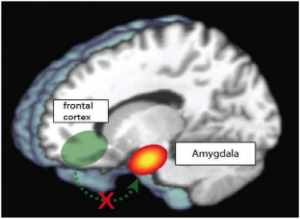SLEEP LINK:
 Sleep is important for mood regulation. If we are sleep deprived, the front part of the brain, called the prefrontal cortex, which is responsible for problem solving and decision making, is unable to communicate well with the inner part of the brain, called the amygdala, which is tied to our emotions. The consequence of this incomplete connection results in the retention of negative memories with lower ability to retain the neutral or positive parts of our day. So if a sleep-deprived child comes home from school having received an A grade on one test and failing another, they are more likely to remember their failure rather than their success.
Sleep is important for mood regulation. If we are sleep deprived, the front part of the brain, called the prefrontal cortex, which is responsible for problem solving and decision making, is unable to communicate well with the inner part of the brain, called the amygdala, which is tied to our emotions. The consequence of this incomplete connection results in the retention of negative memories with lower ability to retain the neutral or positive parts of our day. So if a sleep-deprived child comes home from school having received an A grade on one test and failing another, they are more likely to remember their failure rather than their success.
KEY ARTICLES:
These researchers set out to determine if sleep deprivation leads to depression or depression leads to sleep deprivation in the teenage population. The former proved to be true in their study. 4,175 teenagers aged 11-17 years old were involved in the baseline data portion of this study; 3,134 of those teenagers were followed for a year. Sleep deprivation led to an increase in depressive symptoms and a three-fold increase in the risk for major depression.
Liu X, Sleep. 2004 Nov 1;27(7):1351-8.
This study of 1,362 teenagers (average age 14.6, 60% male) revealed those sleeping < 8 hours at night were about 3 times more likely to make a suicide attempt compared to those sleeping 9 hours or more after adjustment for demographics and depressive symptoms. This latter point is important. It means sleep duration alone is an independent predictor of suicide attempt. A child who is not depressed, yet is deprived, still has a higher potential for a suicide attempt compared to a child who is sleeping more than 9 hours or more.
Boergers J, Gable C, Owens J. Later School Start Time is Associated with Improved Sleep and Daytime Functioning in Adolescents. J Dev Behav Pediatr 35:11-17, 2014. Dr. Owens, a leader in pediatric sleep medicine for decades, and her co-authors once again support what few are now refuting; if school start time is delayed, total sleep time follows suit and benefits follow. In this study, more than 200 high school students filled out surveys reporting total sleep time. When school start time was delayed by 25 minutes, total sleep time increased by 29 minutes. Increases in sleep were associated with decreases in daytime sleepiness, depression and caffeine use.
